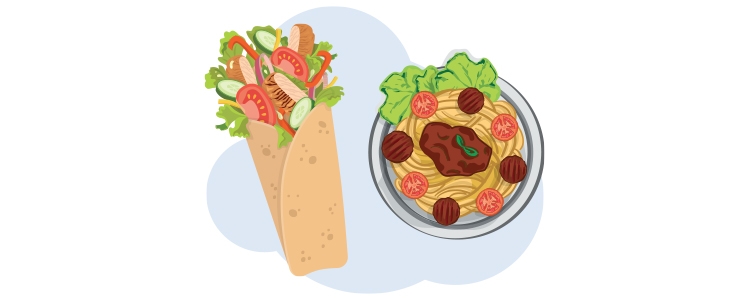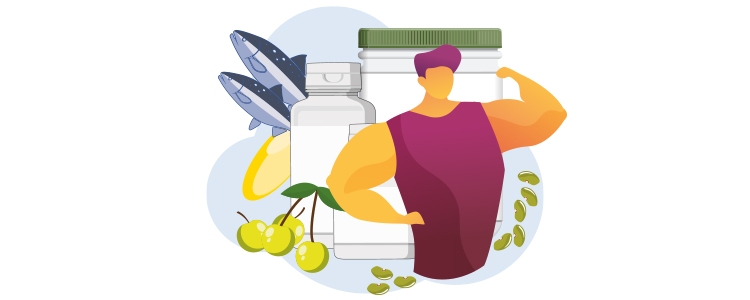Health & Nutrition Trends For The Next Decade
What emerging health and nutrition changes are on the horizon for the next decade?
This year’s calendar flip was a big one, not just a new year but also a new decade. As we look back at wellness trends over the past 10 years, it raises a big question: What emerging health and nutrition changes are on the horizon for the next decade?
To help us scope out these trends, we turned to Holiday Zanetti, a senior research scientist and clinical investigator for Nutrilite brand supplements.
There are a number of lifestyle and wellness movements already gaining a foothold, she said. Here are some she predicts will have staying power over the next decade.

Plant-based eating
The number of people turning to plant-based eating will continue to increase, Holiday said, as people choose meatless meals, swapping plant foods for dairy, meats and other types of ingredients as a way to achieve better health.

Wearable technology
Whether through smart watches or fitness trackers or chips in your clothing or shoes, the market for wearable tech used to monitor your health will boom, Holiday predicted.
Whether you’re tracking sleep, heart rate, physical activity, or fertility windows, this is a growing niche that is fascinating to people trying to organise and analyse their health data.
Along those lines, interest in personalised nutrition, weight management and training apps is also on the upswing, she said.

Meal delivery kits
In the United States, these meal subscriptions have caught on fast. You answer a few questions about what you like to eat, and boxes start appearing at your door filled with fresh ingredients and easy-to-follow recipes.
“I think these will remain popular, especially among working families that are interested in the quick option at least some days of the week,” she said. “Additionally, it’s an excellent option to limit food waste, and certainly it’s appealing to those with limited experience in the kitchen, but who want to eat something tasty that can be personalised to their dietary needs.”
She cautions, though, that while it may be cheaper than ordering a similar meal at a restaurant, you’re still paying extra for the convenience of having everything pre-packaged and delivered.

Watchwords: Traceability, transparency, organic, advocacy
“Consumers today want to know where product ingredients come from, what they are, and what impact they have on the environment”
Many consumers want less packaging and want to know that companies and governments are considering climate change or the environmental impact of how foods are grown, processed and delivered.
Food safety is also a growing concern, causing consumers to seek out companies that focus on transparency and traceability to ensure safety.
Also, more consumers are attracted to the idea of giving back through their purchasing power. People like to know that if they buy a specific product, that company in turn will do something positive for the world, whether it’s planting trees or funneling a specific amount to a charity.

Keto, paleo, Whole30, etc
While these are a few of the current favourites, history tells us there will be another new diet taking the spotlight sometime soon. The prospect of a new, shiny and life-changing diet plan is a strong pull for many, even if deep down they know it’s probably not a good long-term solution.
“Ideally, overall general healthy eating would be here to stay and be the accepted and en vogue way of living, but that would be too easy and basic,” Holiday said. “Consumers are always looking for something new and different that will perceivably change their lives for the better in the short-term.”
While dieting advice and slimming fads will come and go, proper nutrition (eating a well-balanced diet) and daily physical activity will remain the key components of any effective weight management programme.

Foods made from other foods
This new category includes things like pasta made from beans or chickpeas or wraps made from eggs and cheese. It’s a trend that’s expected to continue as people’s ideas about alternate ingredients continue to expand.
“Many food companies see plant-based eating and sustainability trends and are certainly catering to it,” Holiday said. “Pasta made from beans can be a better option than the traditional refined flour choice, since many of these products contain more fibre.”
However, plant-based alternatives are not always the better options, she said. They sometimes require more processing than non-plant versions, might be more harmful to the environment and could even have a worse nutritional profile than their original counterpart.
An example of this is almond milk. Some brands are not fortified, they provide little nutrition, and may impact the environment for a long time when it comes to the water needed to grow the trees and produce the milk.

Plant-based supplements
Plant-based supplements with herbal and botanical ingredients take top honours heading into the new decade, Holiday said. But even more than this, the biggest trend in supplements will be consumers seeking quality, trusted products that contain transparent and traceable ingredients.
The Nutrilite brand has been meeting that mark for decades and recently launched efforts to share its traceability story with consumers. It lays out the path botanical ingredients take from the individual farms where the herbs, fruits and vegetables were grown, to the product consumers hold in their hands.
Go behind the label with Nutrilite! Learn why it is important to know where your supplements come from and do so, with us! Visit https://traceability.nutrilite.com.my/